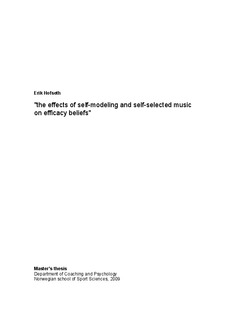| dc.description.abstract | This study investigated the effectiveness of two self-modeling procedures, one with selfselected
music and one without, on self-efficacy (SE) and collective efficacy (CE). The
study had an RCT design with two intervention groups and one control group. The
procedures were conducted in a jr. elite soccer team (n= 22). It was hypothesized that
both procedures would enhance SE and CE and increase the correlations between the
constructs. Further it was hypothesized that the combination of self-modeling and selfselected
music would be a more potent efficacy source than self-modeling solely. Results
suggest, as according to the hypothesis, that self-modeling accompanied by self-selected
music can enhance SE. The results also suggest that such a modeling procedure might
enhance CE. Counter to the hypothesis, self-modeling alone does not in this study seem
to effect neither SE nor CE. An explanation to these results is that the music might act as
an attention aid, focusing the observer’s attention towards the modelled behaviour, and or
it might function as a retention trigger, there is also the possibility that the music solely has effected SE and CE. | en |
